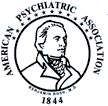|
|
American Psychiatric Association holds symposium on removal of paraphilias from DSM

At its annual convention in May, the American Psychiatric Association (APA) held a symposium to discuss removing gender identity disorder and the paraphilias from the APA's Diagnostic and Statistical Manual of Mental Disorders (DSM). Paraphilias are defined as recurrent and intense sexual feelings or behavior which involve nonhumans, children, or nonconsenting adults, or the suffering or humiliation of oneself or one's partner.1 They include pedophilia, exhibitionism, fetishism, transvestism, voyeurism, and sadomasochism.
The convention was held May 19 in San Francisco. At the symposium, psychiatrist Charles Moser of the Institute for the Advanced Study of Human Sexuality and Peggy Kleinplatz of the University of Ottawa presented a paper entitled "DSM-IV-TR and the Paraphilias: An Argument for Removal."
Media publicity of the symposium was minimal. No information is available at the APA website, and the only reports on the symposium came from the Cybercast News Service (CNS)2 and the National Association for Research and Therapy of Homosexuality (NARTH).3 NARTH is an organization of therapists who practice therapy intended to help homosexuals change to heterosexuality.
According to CNS, Moser and Kleinplatz argued that people whose sexual interests are unusual or culturally forbidden should not necessarily be labeled as mentally ill. Because different societies stigmatize different sexual behaviors, and research cannot distinguish people with paraphilias from those with more common sexual feelings, there is no reason to diagnose the former as psychologically unhealthy.
According to NARTH, Moser and Kleinplatz wrote that the APA defines a mental disorder on the basis of direct, observable evidence of its disabling effects. Since people with "sexually unusual" interests may be not be distressed or disabled by them, there is no justification for classifying them as disordered. Labeling their conditions as "pathological" only fuels social discrimination which can lead to psychologically damaging distress.
Moser and Kleinplatz concluded that "the situation of the paraphilias at present parallels that of homosexuality in the early 1970s. Without the support or political astuteness of those who fought for the removal of homosexuality, the paraphilias continue to be listed in the DSM."
CNS also notes that while the APA's fact sheet on pedophilia says, "An adult who engages in sexual activity with a child is performing a criminal and immoral act that never can be considered normal or socially acceptable behavior," it fails to address whether pedophilia is a mental disorder.
Moser and Kleinplatz are not the only scholars to suggest the removal of pedophilia from DSM. In the December 2002 issue of the journal Archives of Sexual Behavior, noted sexuality researcher Richard Green made a similar argument.4 Researchers and practitioners whose comments were published in the journal were divided on the issue.
Robert Spitzer, author of a study on change of sexual orientation for homosexuals, participated in the APA symposium, arguing for continued inclusion of gender identity disorder and the paraphilias in DSM. He considered the proposal to remove the paraphilias outrageous and believed such removal was unlikely to happen.
According to NARTH, he argued that "The paraphilias, when severe, impair interpersonal sexual behavior. Sexual behavior that facilitates caring bonding between people is normal - and that which impairs it is abnormal, not merely an atypical variation. What is needed is more research on the treatment of the paraphilias, particularly pedophilia. To remove them from DSM-V would be the end of this much-needed research."
In response to criticism of the controversial symposium, the APA issued a statement on June 17 saying that "there are no plans or processes set up that would lead to the removal of the Paraphilias from their consideration as legitimate mental disorders."5
CNS noted that Fred Berlin, founder of the Sexual Disorders Clinic at the Johns Hopkins University Hospital, said people who are sexually attracted to children should learn not to feel ashamed of their condition. It quoted him as saying, "I have no problem accepting the fact that someone, through no fault of his own, is attracted to children. But certainly, such an individual has a responsibility...not to act on it."
2. Morahan, L., "Psychiatric Association Debates Reclassifying Pedophilia,"* CNSNews.com, June 11, 2003.
3. Nicolosi, L., "Should These Conditions Be Normalized?"* NARTH, June 12, 2003.
4. Green, 2002.
5. American Psychiatric Association, "Diagnostic Criteria for Pedophilia,"* Release No. 03-28, June 17, 2003.
*Will open an off-site article in a new window.